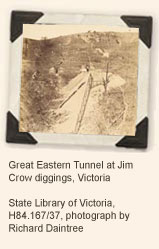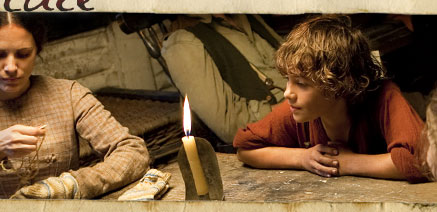
The 1850s gold rushes and the riches that came from these huge finds changed the social, political and economic way of life in the colonies. Between 1851 and 1852, migrants from Europe, the USA and Asia arrived on the goldfields. Men, who had already been here, left their jobs in the towns, cities and farms to search for gold.
Many relied on the guiding and tracking skills of First Nations peoples to travel out from the cities, ford rivers and find food. In 1852 Wiradjuri men Yarri and Jacky Jacky saved 68 settlers lives in the regional town of Gundagai. The men risked their own lives in large bark canoes during a record flood of the Murrumbidgee River. They received bravery medals and a statue in their honour in 2018.
Finding gold proved to be more difficult than at first thought, and while there were some huge finds, most failed to make much money out of gold. Unrest erupted on the Victorian goldfields over the high cost of the government issued licence to dig for gold. This licence was seen as a ‘taxation without representation’ as they could not vote in elections. At that time, only wealthy men could vote. Opposition to the licence led to the battle at Eureka in Ballarat in 1854 between miners and government troops. The subsequent court case - where leaders of the miners’ rebellion were tried for treason but acquitted - proved to the government that changes had to be made. The vote was soon extended to all men, regardless of how much money they had.
This was also a decade that saw an increased number of Chinese people arriving in the colonies. Violence erupted on goldfields against the Chinese. In Victoria the numbers of Chinese migrants were restricted, and the first poll tax was introduced, payable for each Chinese migrant.
Throughout New South Wales and Victoria, by the end of the decade the wealth from gold was used to design and build new roads and railways, and ornate buildings, memorials, parklands, museums, libraries and galleries.





